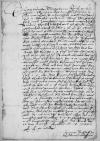So mir Got der almechtig noch VIII iorn(n) vnd V montn(n) widerum(m)b heim hot geholffen(n)
/ vnd zcwischen(n) mir / vnd meynem(m) libn(n) brudern(n) hern(n) ⌊Nibschicz⌋ vil ist geredt, / ouch gehandelt worden(n), / das E(wren) f(urstlichen) G(naden) zu ehren(n) und zu vil guttenn(n) mocht gereichen(n), / hab ich nicht mocht nochlossen(n), der selbig(en) E(wer) G(naden) mit dissem(m) boten(n) zu schreiben(n) / in hoffnung, dis mein(n) schreiben(n), / so ich noch nicht zu E(wern) G(naden) mich nicht vorfuegen(n) mag, / guttlich von mir werd uffnhemen(n) etc. Ich vorsthe, das die ocht des ⌊reichs⌋ E(wer) G(naden) fast zu herczen(n) geth vnd besverlich ist etc. So wold ich wol, das ich derhalben(n) ein(n) stundlein bey E(weren) G(naden) mocht sein(n). / Vorhoffet mich solchs besvernis vil zu geryngeren(n), / dan(n) ich bin disse zceit her(r) darum(m)b und darbey gewest, / ouch mit den um(m)bgangen(n), die das treiben(n). / Befind nicht, das sich E(wer) G(naden) oder das konigreich ⌊Poln(n)⌋ derhalbn(n) fast haben(n) zu bekom(m)eren(n), / und ist so wichtig nicht, wie man sich beduncken(n) lest. / Hirum(m)b, so bitt ich E(wer) G(naden), wold derhalbn(n) ein(n) frey und fridlich gemuet haben(n). / Hoth E(wer) G(naden) uff das mol im ⌊reich⌋ nichts mocht ausrichten(n) besiczende die land ⌊Preussen(n)⌋, / was sol E(wer) G(naden) svache widerpartey ausrichten(n), / die in Preussen(n) nichts hoth, / do von(n) wir, ab Got wil, / im korczen(n) weiter wollen(n) reden(n). Dis schreiben(n) hab ich allein darum(m)b gethan(n), / das sich in mittler zceit E(wer) G(naden) zu fried gebe, der ich mich thu befhelen(n). Got er almechtig geb derselbig(en) E(wer) G(naden) in glugselig(en) zunemen(n) langwerige gesuntheit. /
 GStA, PK, HBA, C 2, No. 26, f. 1v
GStA, PK, HBA, C 2, No. 26, f. 1v  GStA, PK, HBA, C 2, No. 26, f. 1r
GStA, PK, HBA, C 2, No. 26, f. 1r 
